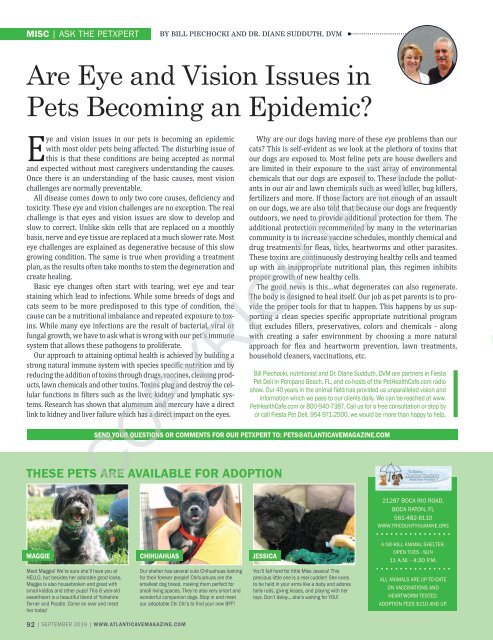Atlantic Ave Magazine September 2019
Create successful ePaper yourself
Turn your PDF publications into a flip-book with our unique Google optimized e-Paper software.
misc | ask the petxpert<br />
BY Bill Piechocki and Dr. Diane Sudduth, DVM<br />
Are Eye and Vision Issues in<br />
Pets Becoming an Epidemic?<br />
Eye and vision issues in our pets is becoming an epidemic<br />
with most older pets being affected. The disturbing issue of<br />
this is that these conditions are being accepted as normal<br />
and expected without most caregivers understanding the causes.<br />
Once there is an understanding of the basic causes, most vision<br />
challenges are normally preventable.<br />
All disease comes down to only two core causes, deficiency and<br />
toxicity. These eye and vision challenges are no exception. The real<br />
challenge is that eyes and vision issues are slow to develop and<br />
slow to correct. Unlike skin cells that are replaced on a monthly<br />
basis, nerve and eye tissue are replaced at a much slower rate. Most<br />
eye challenges are explained as degenerative because of this slow<br />
growing condition. The same is true when providing a treatment<br />
plan, as the results often take months to stem the degeneration and<br />
create healing.<br />
Basic eye changes often start with tearing, wet eye and tear<br />
staining which lead to infections. While some breeds of dogs and<br />
cats seem to be more predisposed to this type of condition, the<br />
cause can be a nutritional imbalance and repeated exposure to toxins.<br />
While many eye infections are the result of bacterial, viral or<br />
fungal growth, we have to ask what is wrong with our pet’s immune<br />
system that allows these pathogens to proliferate.<br />
Our approach to attaining optimal health is achieved by building a<br />
strong natural immune system with species specific nutrition and by<br />
reducing the addition of toxins through drugs, vaccines, cleaning products,<br />
lawn chemicals and other toxins. Toxins plug and destroy the cellular<br />
functions in filters such as the liver, kidney and lymphatic systems.<br />
Research has shown that aluminum and mercury have a direct<br />
link to kidney and liver failure which has a direct impact on the eyes.<br />
Why are our dogs having more of these eye problems than our<br />
cats? This is self-evident as we look at the plethora of toxins that<br />
our dogs are exposed to. Most feline pets are house dwellers and<br />
are limited in their exposure to the vast array of environmental<br />
chemicals that our dogs are exposed to. These include the pollutants<br />
in our air and lawn chemicals such as weed killer, bug killers,<br />
fertilizers and more. If those factors are not enough of an assault<br />
on our dogs, we are also told that because our dogs are frequently<br />
outdoors, we need to provide additional protection for them. The<br />
additional protection recommended by many in the veterinarian<br />
community is to increase vaccine schedules, monthly chemical and<br />
drug treatments for fleas, ticks, heartworms and other parasites.<br />
These toxins are continuously destroying healthy cells and teamed<br />
up with an inappropriate nutritional plan, this regimen inhibits<br />
proper growth of new healthy cells.<br />
The good news is this…what degenerates can also regenerate.<br />
The body is designed to heal itself. Our job as pet parents is to provide<br />
the proper tools for that to happen. This happens by us supporting<br />
a clean species specific appropriate nutritional program<br />
that excludes fillers, preservatives, colors and chemicals - along<br />
with creating a safer environment by choosing a more natural<br />
approach for flea and heartworm prevention, lawn treatments,<br />
household cleaners, vaccinations, etc.<br />
Bill Piechocki, nutritionist and Dr. Diane Sudduth, DVM are partners in Fiesta<br />
Pet Deli in Pompano Beach, FL, and co-hosts of the PetHealthCafe.com radio<br />
show. Our 40 years in the animal field has provided us unparalleled vision and<br />
information which we pass to our clients daily. We can be reached at www.<br />
PetHealthCafe.com or 800-940-7387. Call us for a free consultation or stop by<br />
or call Fiesta Pet Deli, 954-971-2500, we would be more than happy to help.<br />
SEND YOUR Questions OR COMMents for OUR PETXPERT TO: Pets@ATLANTICAVEMAGAZINE.COM<br />
COPYRIGHTED<br />
these pets are available for adoption<br />
21287 Boca Rio Road,<br />
Boca Raton, FL<br />
561-482-8110<br />
www.tricountyhumane.org<br />
MAGGIE<br />
chihuahuas<br />
jessica<br />
A NO-KILL animal shelter.<br />
Open Tues - Sun<br />
11 a.m. - 4:30 p.m.<br />
Meet Maggie! We’re sure she’ll have you at<br />
HELLO, but besides her adorable good looks,<br />
Maggie is also housebroken and great with<br />
small kiddos and other pups! This 6 year-old<br />
sweetheart is a beautiful blend of Yorkshire<br />
Terrier and Poodle. Come on over and meet<br />
her today!<br />
Our shelter has several cute Chihuahuas looking<br />
for their forever people! Chihuahuas are the<br />
smallest dog breed, making them perfect for<br />
small living spaces. They’re also very smart and<br />
wonderful companion dogs. Stop in and meet<br />
our adoptable Chi Chi’s to find your new BFF!<br />
You’ll fall hard for little Miss Jessica! This<br />
precious little one is a real cuddler! She loves<br />
to be held in your arms like a baby and adores<br />
belly rubs, giving kisses, and playing with her<br />
toys. Don’t delay....she’s waiting for yoU!<br />
All animals are up-to-date<br />
on vaccinations and<br />
heartworm tested.<br />
Adoption fees $110 and up.<br />
92 | september <strong>2019</strong> | www.<strong>Atlantic</strong><strong>Ave</strong><strong>Magazine</strong>.com

















